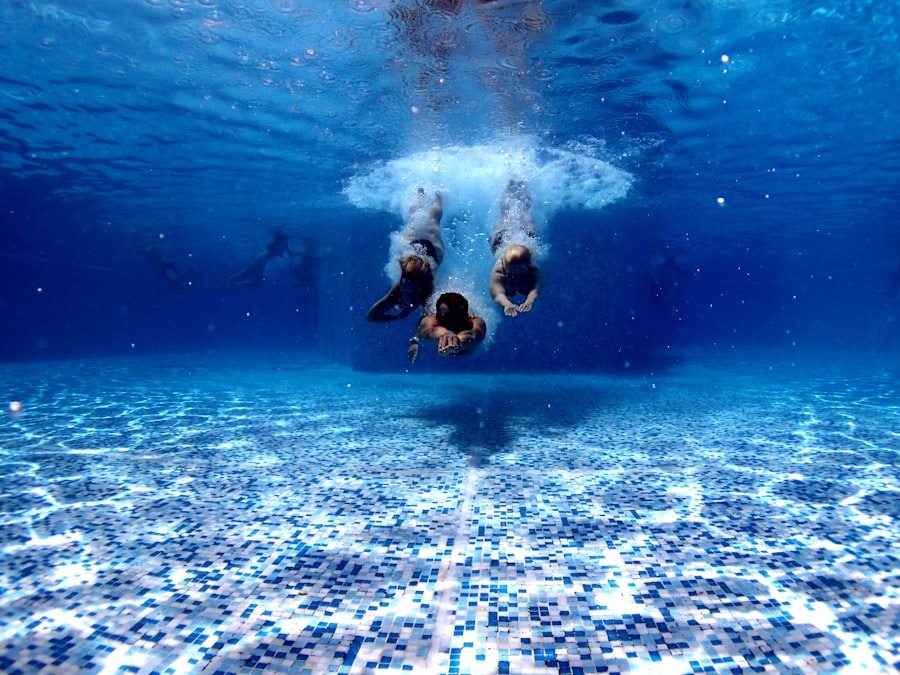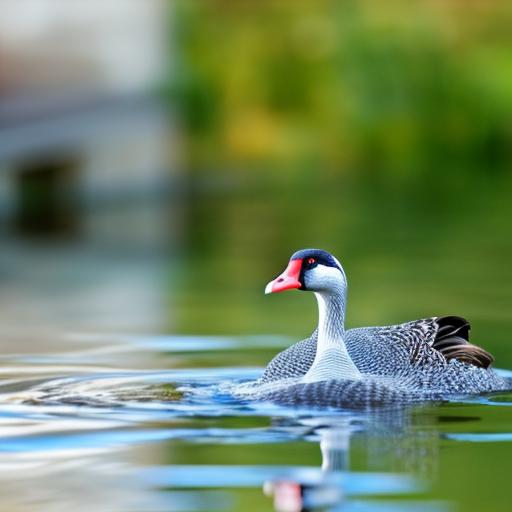Geese are known for their strong migratory instincts and their tendency to gather in large flocks. They are social birds that often travel in groups, and they are highly adaptable to various environments, including urban areas. Geese are also known for their territorial behavior, especially during the breeding season. They are protective of their nesting sites and can become aggressive when they feel threatened or when they perceive a potential threat to their young. Geese are attracted to bodies of water, such as ponds, lakes, and pools, as they provide a source of food and a safe place for them to rest and groom themselves. Understanding the behavior of geese is crucial in developing effective strategies to prevent them from entering pool areas and causing disturbances.
Geese are herbivores and primarily feed on grass, aquatic plants, and grains. They are also attracted to open spaces where they can forage for food and feel safe from predators. Geese are known to be persistent and can return to the same location repeatedly if they find it suitable for their needs. This means that once geese have identified a pool area as a potential feeding or resting spot, they are likely to return to it unless effective deterrents are put in place. By understanding the behavior of geese, pool owners can implement targeted strategies to discourage geese from entering the pool area and minimize the potential for conflicts.
Key Takeaways
- Geese are attracted to pools due to their need for water, food, and safety, and they exhibit territorial behavior.
- Physical barriers such as fences, netting, and pool covers can effectively prevent geese from entering the pool area.
- Natural deterrents like planting certain types of vegetation, using goose repellent sprays, and installing motion-activated sprinklers can keep geese away from the pool.
- Creating distractions such as decoys, floating objects, and reflective materials can redirect geese away from the pool area.
- Implementing sound and visual deterrents like ultrasonic devices, predator decoys, and laser lights can scare geese and discourage them from entering the pool.
- Consistent maintenance and cleaning of the pool area, including removing food sources and nesting materials, can help deter geese from frequenting the area.
- Seeking professional help from wildlife management experts or pest control services may be necessary to address persistent geese issues and ensure effective long-term solutions.
Physical Barriers to Prevent Geese from Entering the Pool
One effective way to prevent geese from entering the pool area is by installing physical barriers that make it difficult for them to access the water. Fencing is a common method used to create a barrier between geese and pool areas. The fence should be at least three feet high and made of materials that are difficult for geese to perch on or climb over, such as smooth metal or plastic. Additionally, installing a gate with a self-closing mechanism can further deter geese from entering the pool area.
Another physical barrier that can be used to prevent geese from entering the pool is a net or mesh cover. These covers can be placed over the pool when it is not in use, effectively blocking access to the water. It is important to ensure that the net or mesh cover is securely fastened to prevent geese from getting underneath it. By implementing physical barriers, pool owners can create a clear boundary that discourages geese from entering the pool area, reducing the likelihood of contamination and potential conflicts with swimmers.
Natural Deterrents to Keep Geese Away from the Pool
In addition to physical barriers, natural deterrents can be used to keep geese away from the pool area. One effective natural deterrent is planting vegetation that is unappealing to geese around the perimeter of the pool. Geese are attracted to areas with short grass and easy access to water, so planting tall grasses, shrubs, or other dense vegetation can make the area less attractive to them. Additionally, certain plants, such as gooseberry bushes or holly bushes, have thorns or prickly leaves that can deter geese from approaching.
Another natural deterrent is the use of predator decoys, such as fake coyotes or owls, which can create the illusion of danger and discourage geese from entering the pool area. These decoys should be moved regularly to prevent geese from becoming accustomed to their presence. Another natural deterrent is the use of reflective objects, such as aluminum foil strips or shiny tape, which can create visual disturbances that make geese feel uneasy and less likely to approach the pool area. By utilizing natural deterrents, pool owners can create an environment that is less appealing to geese, reducing the likelihood of them entering the pool area.
Creating a Distraction to Redirect Geese Away from the Pool
Creating a distraction is another effective strategy for redirecting geese away from the pool area. One way to do this is by providing an alternative source of food for geese in a location away from the pool. This can be done by setting up feeding stations with cracked corn or other grains in an area that is less frequented by swimmers. By providing an alternative food source, pool owners can encourage geese to forage in a different location, reducing their presence around the pool area.
Another way to create a distraction is by using floating decoys or devices that create movement on the surface of the water. These devices can include floating buoys or inflatable objects that move with the wind, creating ripples and disturbances on the water’s surface. This movement can make geese feel uneasy and less inclined to approach the pool area. By creating distractions that redirect geese away from the pool, pool owners can minimize the potential for conflicts and contamination of the water.
Implementing Sound and Visual Deterrents to Scare Geese
Sound and visual deterrents can be effective in scaring geese away from the pool area. One common sound deterrent is the use of propane cannons or other noise-making devices that emit loud sounds at regular intervals. These devices create a sense of danger and disrupt the peace and quiet that geese seek, making them less likely to linger in the area. It is important to use these devices in moderation and in accordance with local noise ordinances.
Visual deterrents, such as scarecrows or flags, can also be used to scare geese away from the pool area. Scarecrows can create the illusion of a human presence, making geese feel threatened and less likely to approach. Flags or other visual deterrents that move with the wind can create visual disturbances that make geese feel uneasy and less inclined to enter the pool area. By implementing sound and visual deterrents, pool owners can create an environment that is less appealing to geese, reducing their presence around the pool area.
Consistent Maintenance and Cleaning of the Pool Area

Consistent maintenance and cleaning of the pool area are essential in preventing geese from being attracted to the space. Regularly removing debris, such as leaves and grass clippings, from around the pool can help eliminate potential food sources for geese and make the area less appealing to them. Additionally, keeping the grass around the pool area well-maintained and mowed can discourage geese from foraging for food in that location.
It is also important to regularly clean and maintain the pool itself to prevent algae growth and other issues that can attract geese. Keeping the water clean and properly balanced can help minimize the likelihood of geese being drawn to the pool area. By consistently maintaining and cleaning the pool area, pool owners can create an environment that is less attractive to geese, reducing their presence and potential for conflicts.
Seeking Professional Help to Address Persistent Geese Issues
In some cases, persistent geese issues may require professional assistance to effectively address. Wildlife management companies specialize in developing strategies for deterring geese and other nuisance wildlife from commercial and residential properties. These professionals can conduct site assessments and implement targeted solutions tailored to specific needs.
Another option is seeking assistance from local wildlife authorities or animal control agencies. These organizations may have resources and expertise in dealing with geese-related issues and can provide guidance on legal and humane methods for managing geese populations.
In conclusion, preventing geese from entering pool areas requires a multi-faceted approach that takes into account their behavior and natural instincts. By implementing physical barriers, natural deterrents, distractions, sound and visual deterrents, consistent maintenance, and seeking professional help when needed, pool owners can effectively minimize the presence of geese around their pools while maintaining a safe and enjoyable environment for swimmers.
If you’re looking for ways to keep geese from going in your pool, you may also be interested in learning about the mating season for turkeys. Understanding the behavior of different poultry can help you create a more harmonious environment for all your feathered friends. Check out this insightful article on mating season for turkeys to gain valuable knowledge about turkey breeding and behavior.
FAQs
What are some effective methods for keeping geese out of a pool?
Some effective methods for keeping geese out of a pool include installing a fence around the pool area, using decoy predators such as fake alligators or coyotes, and using motion-activated sprinklers to deter geese from entering the pool area.
Are there any natural deterrents that can be used to keep geese away from a pool?
Yes, there are natural deterrents that can be used to keep geese away from a pool. These include planting tall grasses or shrubs around the pool area, using reflective objects such as shiny tape or balloons, and using natural repellents such as grape seed extract or citrus-based sprays.
Is it legal to use certain methods to keep geese away from a pool?
It is important to check local regulations and laws regarding the use of certain methods to keep geese away from a pool. Some areas may have restrictions on the use of certain deterrents or may require permits for installing fences or using decoy predators.
What are the potential risks of having geese in a pool?
Having geese in a pool can pose several risks, including contamination of the pool water with feces and bacteria, damage to pool equipment and surfaces, and potential safety hazards for swimmers due to aggressive behavior from geese.
How can I prevent geese from returning to the pool area after they have been deterred?
To prevent geese from returning to the pool area after they have been deterred, it is important to consistently maintain the deterrent methods, such as keeping the fence in good condition, moving decoy predators periodically, and regularly applying natural repellents or maintaining natural deterrents.
Meet Walter, the feathered-friend fanatic of Florida! Nestled in the sunshine state, Walter struts through life with his feathered companions, clucking his way to happiness. With a coop that’s fancier than a five-star hotel, he’s the Don Juan of the chicken world. When he’s not teaching his hens to do the cha-cha, you’ll find him in a heated debate with his prized rooster, Sir Clucks-a-Lot. Walter’s poultry passion is no yolk; he’s the sunny-side-up guy you never knew you needed in your flock of friends!







